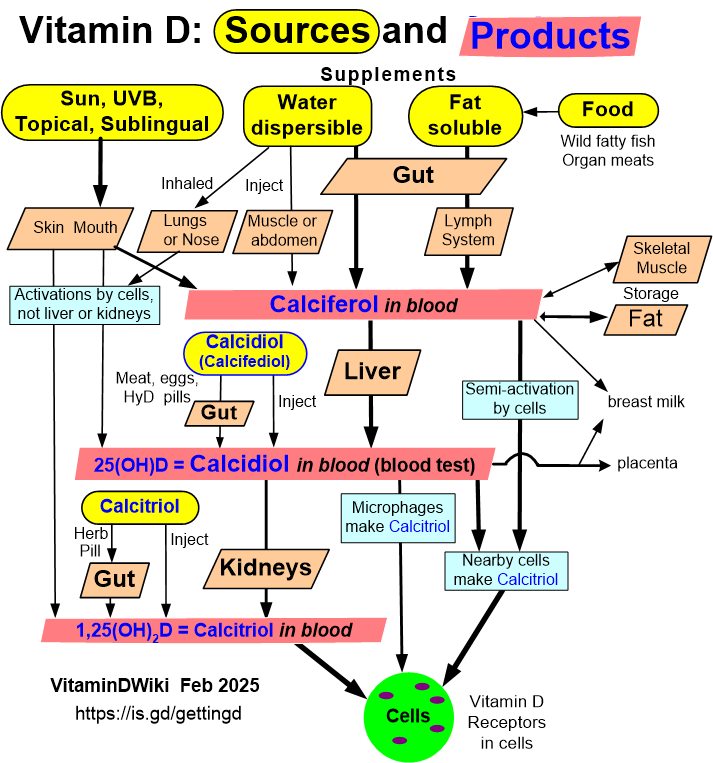Breasts process Vitamin D and change gene activation, might prevent breast cancer if given more Vit. D
Vitamin D as a potential preventive agent for young women's breast cancer
Cancer Prevention Research, DOI: 10.1158/1940-6207.CAPR-21-0114
Sarah M Bernhardt, Virgina F Borges and Pepper Schedin schedin@ohsu.edu
Clinical studies backed by research in animal models suggest that vitamin D may protect against the development of breast cancer, implicating vitamin D as a promising candidate for breast cancer prevention.
However, despite clear pre-clinical evidence showing protective roles for vitamin D, broadly targeted clinical trials of vitamin D supplementation have yielded conflicting findings, highlighting the complexity of translating pre-clinical data to efficacy in humans.
While vitamin D supplementation targeted to high-risk populations is a strategy anticipated to increase prevention efficacy, a complimentary approach is to target transient, developmental windows of elevated breast cancer risk. Postpartum mammary gland involution represents a developmental window of increased breast cancer promotion that may be poised for vitamin D supplementation.
Targeting the window of involution with short-term vitamin D intervention may offer a simple, cost-effective approach for the prevention of breast cancers that develop postpartum. In this review, we highlight epidemiologic and preclinical studies linking vitamin D deficiency with breast cancer development.
We discuss the underlying mechanisms through which vitamin D deficiency contributes to cancer development, with an emphasis on the anti-inflammatory activity of vitamin D. We also discuss current evidence for vitamin D as an immunotherapeutic agent and the potential for vitamin D as a preventative strategy for young woman's breast cancer
Section Titles
Overview of Vitamin D
Vitamin D signaling in breast cancer
Vitamin D in breast cancer progression and metastasis
Anti-inflammatory actions of vitamin D within the tumor microenvironment
Vitamin D as a therapeutic for the prevention of breast cancer
Targeting vitamin D to high-risk populations
Future research directions
Conclusion
There is strong evidence that downregulation of vitamin D signaling contributes to the development and progression of breast cancer. Epidemiological studies have linked vitamin D deficiency with an increased risk of breast cancer development; observations that are well-supported by research in animal models. However, while the potential for vitamin D as a breast cancer preventative agent is well-backed by pre-clinical data, clinical trials of vitamin D supplementation have produced modest and/or conflicting results. Vitamin D supplementation during transient, developmental windows of elevated risk may instead offer a more effective approach for the prevention of breast cancer. Post- lactational involution represents a key developmental window that may be poised for vitamin D supplementation. The unique demands for vitamin D during pregnancy and lactation emphasize vitamin D deficiency during the postpartum period, which in the background of the pro-inflammatory microenvironment of the involuting gland may enhance the tumor promotional attributes of involution. Attenuation of the inflammatory microenvironment of the vitamin D-deficient involuting breast with short-term vitamin D supplementation may offer protection against the development of postpartum breast cancer. Further research into the protective role of vitamin D against postpartum breast cancer development and progression is warranted.
📄 Download the PDF from VitaminDWiki

Note: This study indicates that Breast gets semiactivated Vitamin D p from the liver. Other studies indicate that the liver is not needed
Activating the Vitamin D Receptor increases Vitamin D

CYP27B1 increases Vitamin D

CYP24A1 decreases Vitamin D

Overview Breast Cancer and Vitamin D contains:
{include}
Getting Vitamin D into your blood and cells contains:

CYP27B1 category listing contains:
{include}
Cancers might alter CYP24A1 gene
{include}
The risk of 44 diseases at least double with poor Vitamin D Receptor as of Oct 2019
VitaminDWiki - Vitamin D Receptor activation can be increased in many ways
{include}
Items in both categories Vitamin D Receptor and Cancer - Breast:
{category}
Thus, the breasts try to increase receptor activation and Cancer cells try to decrease activation
Breast cancer and Vitamin D receptors, CP27B1, and CYP24A1 – Sept 2010 chart shows gene changes with breast Cancer

